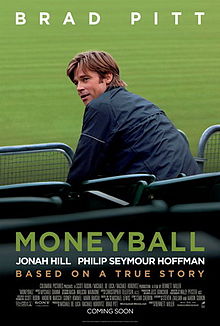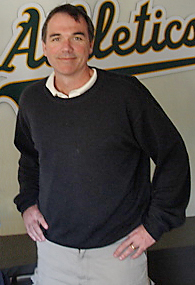 Moneyball is the movie adaptation of the nonfiction book Moneyball: The Art of Winning an Unfair Game by Michael Lewis. When the movie company voiced interest about buying film rights for the book, Michael Lewis’s frank reaction was that he didn’t care, but he wondered if a movie based on a book with such statistics would be interesting. However, after watching the movie, he found that his book actually appealed to a wide audience and he was impressed that the movie accurately presented what he wanted to say.
Moneyball is the movie adaptation of the nonfiction book Moneyball: The Art of Winning an Unfair Game by Michael Lewis. When the movie company voiced interest about buying film rights for the book, Michael Lewis’s frank reaction was that he didn’t care, but he wondered if a movie based on a book with such statistics would be interesting. However, after watching the movie, he found that his book actually appealed to a wide audience and he was impressed that the movie accurately presented what he wanted to say.
Brad Pitt was nominated for the Academy Award for Best Actor for this movie, but the question of “why?” rose up from fans who had expected that Leonardo DiCaprio would seize the prize for this nomination. Leonardo shows his great acting ability in a dramatic performance as J. Edgar Hoover, the Director of the FBI for over 40 years, while Brad Pitt in Moneyball just shows his natural charm and trademark smile. Fans felt things like, “Is Brad even acting?” or “Isn’t this a little unfair?” or “Poor Leo!” However, this movie was interesting certainly largely due to Brad Pitt and this movie allows us to think about modern America in a variety of ways. I think this movie is much more relevant to our modern lives than J. Edgar.
The stage is set in 2001 on the Oakland Athletics, a poor team stationed in Oakland, California. Star athletes Johnny Damon, Jason Giambi, and Jason Isringhausen, as free agents that can decide what team to play for, slip away from the A’s and transfer to teams that offered a larger salary. General manager Billy Beane is desperately searching for a method to win on a limited budget.
One day, during a visit to the Cleveland Indians office for trade negotiations, Beane happens to meet Peter Brand, a Yale graduate. Brand used sabermetrics that objectively evaluated players using various statistics, which is different than how other scouts evaluated players. Beane, despite opposition, immediately recruited Peter Brand for his own team and devises a strategy for victory under a low budget using radical sabermetrics.
Briefly, Beane’s strategy was to not offer huge salaries to players deemed as “star material” based on the subjective criteria generally used in those days; instead, he would use statistics including on-base percentage, slugging percentage, and batting eye, as well as look for players with smart decision-making, to determine the probability of making runs. This would be a big component in determining which players to recruit; many of these players had been ignored by the subjective evaluation and would therefore be cheap to recruit. He was not recruiting young players based on their “future prospects” based on subjective criteria and even gave players who were past the height of their professional careers a chance if there was something they could contribute. By doing so, Beane advanced the Oakland Athletics to the playoffs almost every year and the team set the record for the longest winning streak across all baseball teams in 2002, despite their total annual salary being only one third the amount of the top team, the New York Yankees. In the movie, the Athletics are shown as suddenly becoming a powerful team in 2002, but, in reality, the A’s had consistently been winning in the playoffs, although they had never won the World League. Other teams wondered where the strength of the A’s came from. Because Beane’s strategy relied on statistics, the pattern of the Athletics doing well in their season with many games and often winning their playoffs, but not necessarily winning in the short series of the World League Championships, suggests that his strategy was working.
I believe this movie is not a simple baseball movie because it depicts various important issues in modern America, but what I wish to emphasize are the following three points.
First, this movie, for better or for worse, depicts the characteristics of management of American companies very well. The structure of the baseball industry is the owner, the general manager, and then the manager. The owner offers money to recruit players, the general manager makes the team plan, while the manager runs the actual games. While the manager focuses on making a technical plan for each game, the general manager plans with a more long-term outlook and must have many skills. The general manager maintains a positive public image by making appearances on various interviews as the face of the baseball team, must command the baseball team with charisma, have a sense of management since he has bargaining power with regards to contract renewals and trades, as well as have insight to see the ability of players. The general manager is equivalent to the CEO of a corporation. As it is in top-down management, Beane had considerable power and mercilessly dismissed or traded people under him. However, on the other hand, Beane established an objective standard from statistics and asked players to meet these expectations. Therefore, when a player with a high salary was dismissed, the reason could clearly be explained and the players that were unfortunate enough to not meet the usual subjective standards of “popularity” were motivated when given an opportunity by Beane. The dictatorial power held by a CEO is very American and their power determines the quality of the company management.
Second, this movie criticizes the unfair distribution of wealth spreading across America. It is so in professional baseball, but also, in the world of movies, the price paid for different actors is extremely uneven. From the late 1980s, popular actors and actresses like Tom Cruise and Julia Roberts began to demand enormous performance fees, and other actors began to follow their example. Today, for example, Kristen Stewart, barely 21, is said to demand a performance fee of $20 million for one movie. This is probably equal to the total sum of the salaries of 50 to 100 actors, equally qualified. In other words, Hollywood would rather give a transiently popular young actress one job and take away the jobs from 100 other capable actors or actresses. Recently, Hollywood is reconsidering this inequality and it is said that statistics are used to calculate the ratio of box office performance to actor performance fees in order to evaluate actors. Matt Damon and Naomi Watts are examples of statistically good actors who don’t charge much but perform well. Even Brad Pitt declared that the time of top actors being overpaid with exorbitant amounts of money is ending. I think he worries that the movie industry will decline unless this trend of actors demanding unreasonable amounts of money whenever they become popular is suppressed.
 Finally, there is the issue of personal happiness. Beane, formerly the top player in his high school, was chosen as the future star in the first round of drafts by the New York Mets. Believing the words of the scout and attracted to the high salary offered, Beane declined the student scholarship offered by the prestigious Stanford University and chose the professional route; after not much success as a player, Beane switched to being a scout and began his second career in baseball. After his success with the Athletics, the Boston Red Sox offered him $12.5 million, the highest offer for a general manager in history; however, Beane declined the offer because he decided to not make a life choice based on money. He did not want to be separated from his daughter who lived in California, and he loved the Oakland Athletics. Oakland is between San Francisco, the most refined city in America, and Berkeley, an academic center. This city has a unique culture and is extremely politically liberal for America, but a large portion of the residents are poor black people. The event of a black teenager being shot and killed by the police sometimes happens. The Oakland A’s give something for local residents to be proud of, provide casual entertainment, and lift the spirits of young people. Beane did not forsake the team for money. There are other managers who have adopted Beane’s strategy of sabermetrics. Now that he was familiar with the A’s, there was no reason to start over again.
Finally, there is the issue of personal happiness. Beane, formerly the top player in his high school, was chosen as the future star in the first round of drafts by the New York Mets. Believing the words of the scout and attracted to the high salary offered, Beane declined the student scholarship offered by the prestigious Stanford University and chose the professional route; after not much success as a player, Beane switched to being a scout and began his second career in baseball. After his success with the Athletics, the Boston Red Sox offered him $12.5 million, the highest offer for a general manager in history; however, Beane declined the offer because he decided to not make a life choice based on money. He did not want to be separated from his daughter who lived in California, and he loved the Oakland Athletics. Oakland is between San Francisco, the most refined city in America, and Berkeley, an academic center. This city has a unique culture and is extremely politically liberal for America, but a large portion of the residents are poor black people. The event of a black teenager being shot and killed by the police sometimes happens. The Oakland A’s give something for local residents to be proud of, provide casual entertainment, and lift the spirits of young people. Beane did not forsake the team for money. There are other managers who have adopted Beane’s strategy of sabermetrics. Now that he was familiar with the A’s, there was no reason to start over again.
Within the movie, there’s a scene where Beane’s daughter worries about her father being fired, but we don’t have to worry. After Beane’s continued success, his contract was extended until 2019. Billy Beane was chosen by Sports Illustrated magazine as the Top Sports Manager of the 2000s and he is recognized as the top manager throughout the baseball world today.
